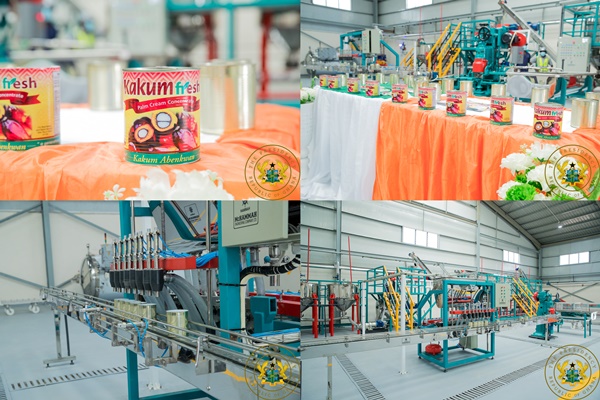The President of the Republic, Nana Addo Dankwa Akufo-Addo, has inspected work Central Oil Mills Limited, a wholly Ghanaian owned agro-processing company located at Jukwa Mfuom/Asamanso in the Hemang Lower Denkyira District of Central Region, which specialises in oil palm development and palm oil processing, and is operating under Government’s 1-District-1-Factory initiative.
President Akufo-Addo visited the factory, on Tuesday, 19 th October 2020, on day 2 of his 2-day tour of the Central Region.
As part of Government’s Industrial Transformation Agenda, Central Oil Mills, established in 2010, was identified as one of the potentially viable but distressed companies.
To this end, an organisational audit was conducted by a team of technical consultants from the Ministry of Trade and Industry, who recommended the company to the Ghana EXIM Bank for support under the One District One Factory (1D1F) programme.

Ghana Exim Bank, on 21st November 2018, approved a Medium-Term Loan Facility of GH¢12 million for Central Oil Mills Limited to undertake three main activities:
These are the rehabilitation and expansion of an existing primary crude palm oil processing factory at Jukwa-Mfoum, the establishment of a brand new secondary (value-addition) oil palm processing factory at Jukwa-Asamanso, with capacity to process vegetables (Canned and bottled products), and the expansion and development of oil palm plantation.
The Bank subsequently approved a supplementary loan of GH¢2 million for the project, thus bringing the total loan approved for the project to GHS14 Million.
The new factory at Asamanso and the expansion work at Mfuom are about 95% and 90% completed respectively, and are both expected to be fully completed by 30 th November 2021.
The project involves the expansion of an existing oil palm mill with an initial capacity of 2,400 metric tonnes of fresh fruit bunches (FFB) per annum into a bigger mill with a minimum capacity of 12,000 metric tonnes of FFB per annum on a single shift, with capacity to do double shifts.
With a yield of 20%, this will produce 2,400 metric tonnes of palm oil per annum which could be processed into secondary canned and bottled products. In addition, through the revitalisation process, the company has increased its storage capacity from 30 metric tonnes to 150 metric tonnes.
The company has rehabilitated it existing oil palm plantation and has initiated the process to expand its plantation by 200 acres per annum over five years. This is being supported by the acquisition of new trucks, and farm implements to support cultivation and transportation. The company also has existing nucleus farms at Jukwa Mfuom and its environs and also about 50 out-grower individuals.
The project is expected to create a minimum of 200 direct jobs from its current skeletal workforce of 30 persons when fully operational. More than 500 indirect jobs will be created within two years at both factory sites and from the plantation.
Buyers from South Africa, Italy, Netherlands and Nigeria are already in discussions with the company for export of finished products, thus opportunity to generate foreign exchange for the country.











